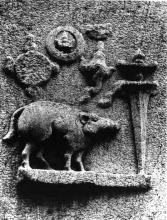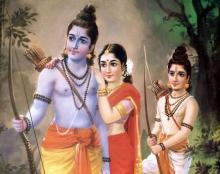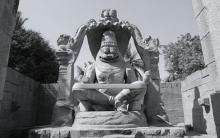Mālyavanta is distressed that his plans are failing. (The burning of Laṅkā; Akṣakumāra is slain; Hanūmān offers Rāma’s ring as a token of recognition to Sītā); conversation between Rāvaṇa and Mandodarī. (Laṅkā is besieged by the vānara army). Aṅgada comes to Rāvaṇa as a messenger; the events of the battle between Rāma and Rāvaṇa are described by Vāsava and Citraratha. (Slaying of Rāvaṇa). [Aṅka 6]
Author:hari
४.७. अलङ्कारसुधानिधेः सारः शास्त्रपरम्परायां तत्स्थानं च
४.६. उदाहरणपद्यानि
भोगनाथविरचितानि उदाहरणपद्यानि सायणाचार्यविजयनगरसाम्राज्यसम्बद्धानेकविषयस्फोरकाणीति प्रागेव प्रत्यपादि। अत्र विप्रतिपद्यमानाः केचिदाचक्षीरन्—काव्यसहजया नैकालङ्कारभूषितया शैल्या सन्दृब्धानि पद्यानीमानि सत्यदूराणीति। नैवं युक्तं वक्तुम्। सालङ्कारा शैली भूषणमेव न दूषणमिति इहोदाहरिष्यमाणानि पद्यान्यवलोक्य बोद्धुम् अर्हन्ति सन्तः॥
One of the manuscripts of the Mālatī-mādhava states that the work was authored by Bhaṭta-kumārila’s student (prose at the end of Act 3); the colophon at the end of the sixth act in same manuscript says that Umbekācārya authored it; furthermore, the colophon at the end says Kumārila’s student Bhavabhūti penned the play. From this, it is reasonable to think that Bhavabhūti is no different from Kumārila’s student Umbekācārya. However, we must reflect upon the amount of importance we must associate with these colophons. None of the other manuscripts say anything similar to this.
मध्य भारतीय मुस्लिम साम्राज्य जैसे अहमदनगर, बरार, बीदर, गोलकुण्डा, बीजापुर, गुलबर्गा आदि सतत रूप से लड रहे थे जिसमें यदाकदा विजयनगर का राजा किसी भी एक मुस्लिम राज्य का पक्षधर हो जाता था। इतिहासकारों के अनुसार रामराय ऐसे राजनैतिक दांवपेच किया करता था जो उसका एक कूटनीतिक हथियार था, किंतु जब उसके संबंध पुर्तगालियों से खराब हुए और उसे उसके विरुद्ध कूटनीतिक असफलता प्राप्त हुई तो उसने उन्हें युद्ध में हराते हुए उनके एक लाख पैगोडा छीन लिए। यद्यपि वह शक्ति संपन्न तथा योग्य था किंतु राजनैतिक कौशल की उसमें कमी थी। वह समस्याओं के मूल की पहचान नहीं कर पाया था। उसकी एक बड़ी
४.२. गुणदोषौ
शरीरगताः शौर्यादयो गुणा आत्मानमिव काव्यशरीरगताः प्रसादादयो गुणाः काव्यात्मानं रसम् उत्कर्षयन्ति—
शौर्यादय इवात्मानं ये धर्मा अङ्गिनं रसम्।
उत्कर्षयन्ति नियतस्थितयस्ते गुणा इह॥ १.१११
नयन्ति नित्यमुत्कर्षं समवायाद्रसं गुणाः।
शौर्यादय इवात्मानं शरीरेषु शरीरिणाम्॥ १.११३
Bhavabhūti is the author of three plays, namely – Mahāvīra-carita, Mālatī-mādhava, and Uttara-rāma-carita. It is quite probable Mahāvīra-carita was the first play that he penned. In the play, he narrates his biographical details as follows –






